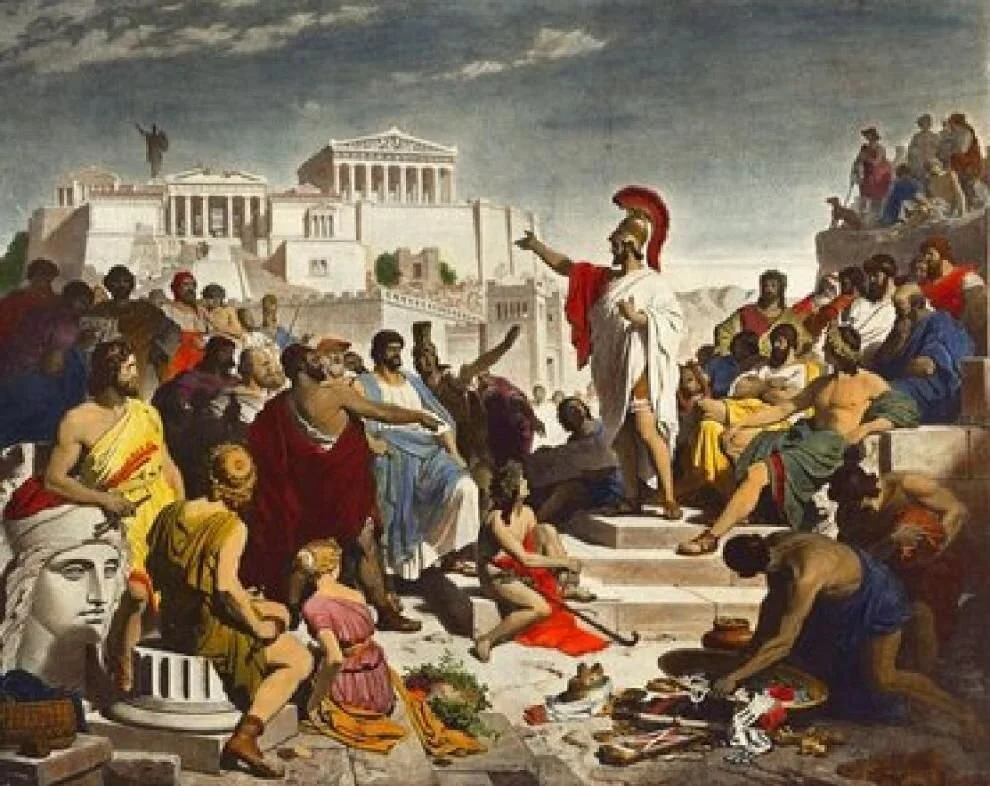In ancient Greece, as well as in cultures of that time, weapons were an important part of daily life. War was a constant threat to society and was more than just a possibility for a war to occur in everyone's life. Whether it was greedy external enemies or other interests that led to civil unrest, the war was always around the corner.
And so it was convenient to have your weapons somewhere nearby or even on you, while leaders used to have their personal guards, just as they do today.
Weapons were not for everyone
The ancient Greeks remain one of the oldest civilizations to enforce "gun laws". This occurred at a time when the ever-changing political situation of the pre-democratic Greek city-states constantly called for military action, especially as the Greeks were constantly involved in conflicts both with each other and with neighboring or distant tribes (Persian Wars, Peloponnesian War). coke.).
Although weapons played a major role in Greek culture, the Greeks had long recognized the need to limit their use in a benevolent society. As we know, arms were supplied and brought by the wealthy, since in most Greek armies the hoplite was required to provide his own military equipment.
Weapons in some cases meant wealth and economic prosperity that distinguished the truly rich from the average citizen. Men could own as many weapons as they wanted, for it is not recorded that there was a limit to the number or type of weapons one could own.
In most of the city-states, every young citizen was bound by law to serve his country militarily and to bear his own arms. Only he was not allowed to bring them into public places within the city, with the sole exception of the possibility of marching into battle or participate in military training.
Thucydides tells us (in the first book of the "History of the Peloponnesian War") that the Athenians were among the first to establish laws against the possession of arms in public places.
Furthermore, while the young Athenians kept their weapons at home, Aristotle tells us in his "Politics" that older men who were no longer in active military service were not supposed to own weapons, suggesting that there was probably a tradition of elders giving up their weapons to the community.
Xenophon, however, also tells us of the Spartans that in times of peace they were unarmed and kept their weapons well secured in their houses. So in Sparta too, the Athenian historian claims, citizens were only allowed to bear arms during religious ceremonies or in military training. It is not clear, however, whether this was prescribed by law or was a simple daily custom.
And the example of the Lacedaemonians is even more telling, for they too had to contend with the constant internal danger of the Helots who revolted, and the Spartan citizens had to nip the revolts in their beginning.
Aristotle once again points out the dangers that generalized possession of arms poses to democracy itself, and refers to the strategy of the Athenian tyrant Peisistratus, who managed to seize power with such a ploy.
In 561 BC, he injured himself and appeared in the market covered in blood, claiming that someone wanted to kill him. So he persuaded the Athenian citizens to give him his personal guard of 50 armed men, even though Solon had responded to his sinister intentions to overthrow democracy. And indeed he used this guard, first increasing it in number and armament, and eventually occupying the Acropolis and power.
Since he was the only one carrying weapons in the community, he sent the citizens home, advising them to mind their business and leave the government to him. Simply because they allowed him to carry arms within the walls of Athens.
Politics and weapons do not go together
Ancient Greek literature states from the archaic period (800-480 BC) that no one was allowed to go to the market with their weapons strapped on. The same thing happened in temples and places of worship, you had to leave your sword unless it was the ritual swords and knives that the priests brought.
If political fights took place then it was possible for a weapon to appear. And Greek literature had to tell the famous story of the lawgiver Charon, that is, the same man who, at the end of the 6th century B.C., in the Agora of Catania, the colony of the Chalcidians in Sicily (modern Catania) had called for the enactment of a law prohibiting arms.
Charon insisted emphatically that anyone who wished to take part in the public speeches and political decisions of the city had to lay down his arms outside the assembly. One day, however, when he returned from a journey and went straight to the podium of the assembly, he forgot to pass by his house to leave his sword, which he carried for his protection. When the citizens of Catania saw that he was breaking his own law, they laughed at him.
And he, to prove his devotion to the law on the control of weapons, pulled out his knife and committed suicide on the spot. The story is written by Diodoros Sikeliotis, a historian of the 1st century BC, in his "Library", and he even says that Charon had introduced the death penalty for violations of this law because he wanted to make it clear that no one would carry weapons in the political arena.
It must have been Charon's example that established the tradition in the colonies of Greater Greece (Sicily and Southern Italy) of particularly strict laws against the possession of arms within the city limits. That is, much more rigid than the city-states of predominantly Greece.
However, the Greek literature attributes the establishment of arms control laws to the universal influence of Pythagoras, who is said to have been one of the most ardent preachers against the possession of arms in peacetime, and who called on the Greeks early on to restrict the use of weapons.
How do you keep people safe?
Charon's commitment to the law on general disarmament in Municipal Assembly became an example to be emulated by the Greek public, as everyone showed his intention to protect his fellow citizens from the threat of weapons.
In the cradle of democracy and the cradle of Western civilization, therefore, it was a sign of civilization not to carry weapons in one's daily interactions with his fellow citizens.
















